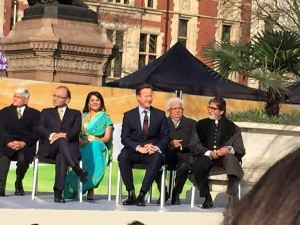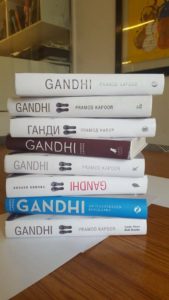Even the terms used to describe the famous Indian uprising against the British in 1857 are political positions. Was it a mutiny, or India’s First War of Independence? Rebellion or uprising? A nationalist movement or a string of local protests?
p.243, “Lakshmi Bai, Rani of Jhansi: Bad-ass Queen (1828-1858)”
‘A society, almost necessarily, begins every success story with the chapter that most advantages itself,’ the American public intellectual Ta-Nehisi Coates recently argued regarding mythic constructions of liberation all over the world. ‘[C]hapters are almost always rendered as the singular action of exceptional individuals.’ In modern India’s myth of finally, formally confronting its brutal history of case, Bhimrao Ambedkar is that exceptional individual. But every Great Man story is also a story of circumstance. Had India not been devastated by Partition, the formidable lawyer and scholar who led the untouchables might not have become the founding father most meaningful to ordinary Indians today.
p.468 “Ambedkar: Building Palaces on Dung Heaps (1891-1956)”
Sikri’s battlements, palaces, shrines proclaim imperial grandeur. But its airy pavilions and halls share little in common with the heavy monumentalism of Versaille or the Habsburg seats of power. Parts of the city have the feeling of a tent encampment, except that the animal skins and wood frames have been replaced by stone and marble, carved with great skill by local craftsmen. Walking through this now desolate cityscape in the dry heat, you might feel, at certain turns, as if you were in one of M.C. Escher’s drawing, reworked with the stark surrealism of Giorgio de Chirico. It’s like touring the physical manifestation of a mind — the expansive, syncretic mind of its creator: Akbar, the greatest of the Mughal emperors.
p. 165 “Akbar: The World and the Bridge ( 1542-1605)
Sunil Khilnani’s magnificent Incarnations: India in 50 Lives gives a bird’s-eye view of history via the short account of people through their ages. The fifty people profiled are those who left a significant stamp in the socio-cultural-political and economic make-up of this land evident in modern India –a nation state that is very complicated, multi-layered. These biographical accounts written like “non-fiction short stories” detail the life and achievements of the person being profiled while placing them neatly in their historical and contemporary context. Incarnations has been published to coincide with the BBC Radio 4 series http://www.bbc.co.uk/programmes/b05rptbv. The principle of arrangement of this book is probably borrowed from another extremely popular BBC Radio 4 series + sumptiously produced book by Neil MacGregor, then director of the British Museum, on A History of the World in 100 Objects ( http://www.bbc.co.uk/programmes/b00nrtd2/episodes/downloads ).
Yet Incarnations is very much in the tradition of books written trying to make history accessible to the lay reader. To document history in this fashion probably began with Jawaharlal Nehru’s Glimpses of World History to many accounts at chronicling this fascinating sub-continent by authors like Amartya Sen, Jean Dreze, Shashi Tharoor, Ramachandra Guha, Patrick French, Bipin Chandra, Romila Thapar, Percival Spear, Narayani Gupta, Subhadra Sen Gupta ( for children) et al. There were many volumes that were published to coincide with the fiftieth year of Independence but it is for the first time that a historian like Sunil Khilnani has put together an account that incorporates even lesser known individuals such as Malik Ambar the African slave who become powerful political force to contend with.
We live in a noisy, reactionary and surprisingly ahistorical world where lies and misinterpretations get amplified rapidly using social media platforms. So to have a book recount landmark moments in history through well-written biographies is a crucial and much appreciated contribution to social discourse. The style of writing is wonderfully catchy beginning with the chapter headings. For instance, Rani Lakshmi Bai, the queen who is almost revered for her resistance to the British colonial rulers in the nineteenth century with Indian school children even today being taught to memorise poems extolling her heroism; she is simply referred to as the “Bad-Ass Queen”. The list of contents is a delight to read. Similarly are the introductory paragraphs to every chapter –packed with facts, information and incorporating the broad spectrum of views on how the moment in history being discussed in the chapter has been perceived. It is a remarkable example of immense scholarship with a fine sensibility of being able to communicate with a non-academic audience. Peppered in the book are cross-references to other chapters illustrated by the names being marked in bold, a neat technique taken from academic publications and inserted into a trade title.
Outlook magazine’s 19 February 2016 issue focussed on Sunil Khilnani’s book with generous extracts from the book along with an in-depth interview by Satish Padmanabhan. Here is a link to the special issue and interview: http://www.outlookindia.com/magazine/issue/11449 and http://www.outlookindia.com/magazine/story/self-criticism-and-not-glib-self-congratulation-is-the-deepest-form-of-patriotis/296684 .
For all the stupendous historical detailing in each biography there are some disturbingly  puzzling glossing over historical facts. For instance not referring to General Dyer by name instead saying “the officer” ( p.437) or referring to the campaign of installing Gandhi’s statue in London ( 2015) led by Lord Meghnad Desai and his wife, Lady Kishwar Desai but once again not pinning it in history by taking any names. Baffling since General Dyer is well-remembered in India and the
puzzling glossing over historical facts. For instance not referring to General Dyer by name instead saying “the officer” ( p.437) or referring to the campaign of installing Gandhi’s statue in London ( 2015) led by Lord Meghnad Desai and his wife, Lady Kishwar Desai but once again not pinning it in history by taking any names. Baffling since General Dyer is well-remembered in India and the  topiary at Jallianwala Bagh nevers allows anyone to forget the dastardly massacre. Similarly, the campaign to instal Gandhi’s statue was a very political and public event splashed across worldwide media with David Cameron PM, UK and Arun Jaitley, Union Finance Minister, India, Gopal Krishna Gandhi, Amitabh Bachchan, Lord Meghnad Desai and Lady Kishwar Desai attending the unveiling of the statue. So it does leaves a tiny lingering of doubt about the other bits of history that may have been silenced. Even so, this is is a splendid book and must be read.
topiary at Jallianwala Bagh nevers allows anyone to forget the dastardly massacre. Similarly, the campaign to instal Gandhi’s statue was a very political and public event splashed across worldwide media with David Cameron PM, UK and Arun Jaitley, Union Finance Minister, India, Gopal Krishna Gandhi, Amitabh Bachchan, Lord Meghnad Desai and Lady Kishwar Desai attending the unveiling of the statue. So it does leaves a tiny lingering of doubt about the other bits of history that may have been silenced. Even so, this is is a splendid book and must be read.
Sunil Khilnani Incarnations: India in 50 Lives Allen Lane, an imprint of Penguin Books, Penguin Random House, UK, 2016. Hb. pp. 636 Rs. 999
9 March 2016
 Well known publisher Pramod Kapoor, founder, Roli Books, has published his first book as author — Gandhi: An Illustrated Biography . It is a scrumptiously designed edition with plenty of photographs laid out throughout the book. More importantly it is lucidly written and immediately immerses the reader into the narrative. Writing biographies is not an easy nor an enviable task as the author is always trying to balance the narrative between being in the footsteps of their subject or stressing on only a few aspects leaving out large chunks of facts. Pramod Kapoor in his book Gandhi achieves the fine balance with panache. There is a grace with which he documents Gandhi’s life as well delves into uncomfortable subjects such as Gandhi’s sexuality, troubled relationship with his eldest son or even the vow he took of celibacy aged 37 and yet opted to sleep naked at night with young women including his beloved niece in his bed. Historian Sunil Khilnani has endorsed the book saying ” Pramod Kapoor’s book is a personal and wonderfully intimate photographic journey through Gandhi’s life. Even those familiar with Gandhi’s story will disocver things with surprise, delight, and inform them in this moving book.”
Well known publisher Pramod Kapoor, founder, Roli Books, has published his first book as author — Gandhi: An Illustrated Biography . It is a scrumptiously designed edition with plenty of photographs laid out throughout the book. More importantly it is lucidly written and immediately immerses the reader into the narrative. Writing biographies is not an easy nor an enviable task as the author is always trying to balance the narrative between being in the footsteps of their subject or stressing on only a few aspects leaving out large chunks of facts. Pramod Kapoor in his book Gandhi achieves the fine balance with panache. There is a grace with which he documents Gandhi’s life as well delves into uncomfortable subjects such as Gandhi’s sexuality, troubled relationship with his eldest son or even the vow he took of celibacy aged 37 and yet opted to sleep naked at night with young women including his beloved niece in his bed. Historian Sunil Khilnani has endorsed the book saying ” Pramod Kapoor’s book is a personal and wonderfully intimate photographic journey through Gandhi’s life. Even those familiar with Gandhi’s story will disocver things with surprise, delight, and inform them in this moving book.”

